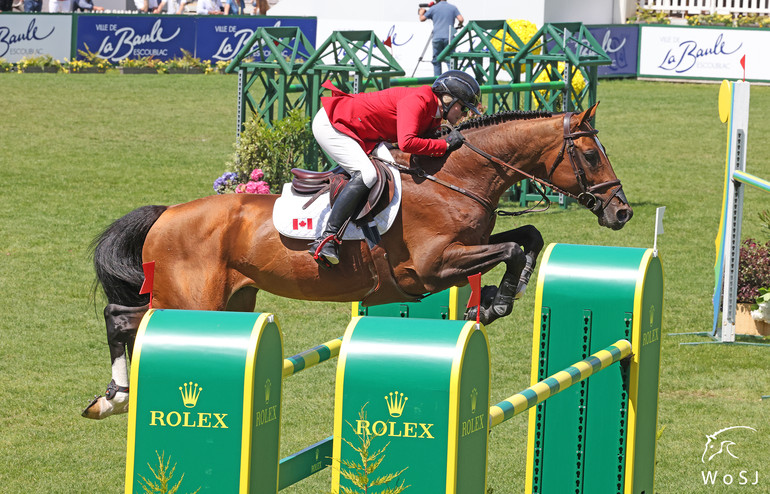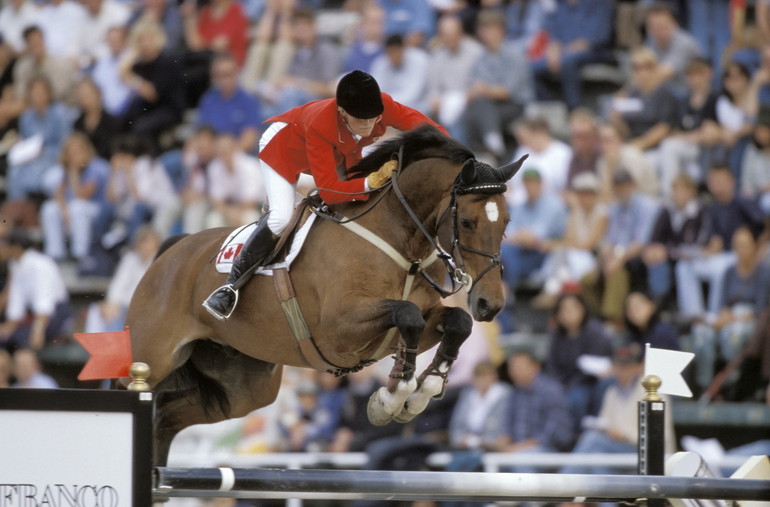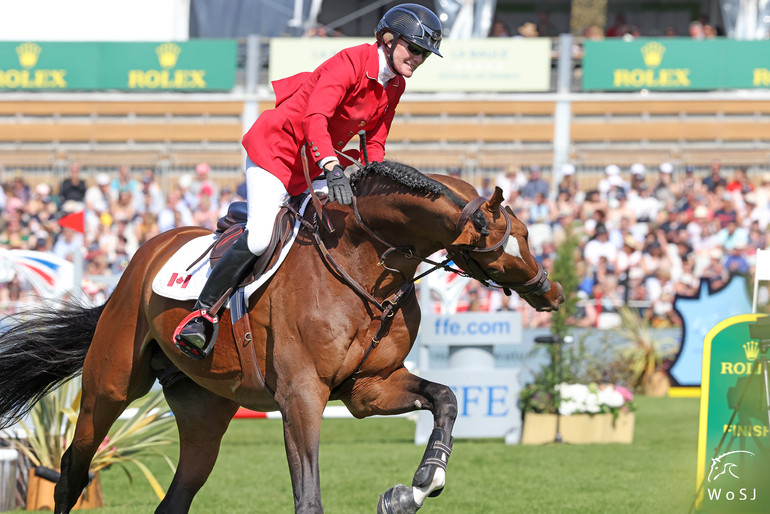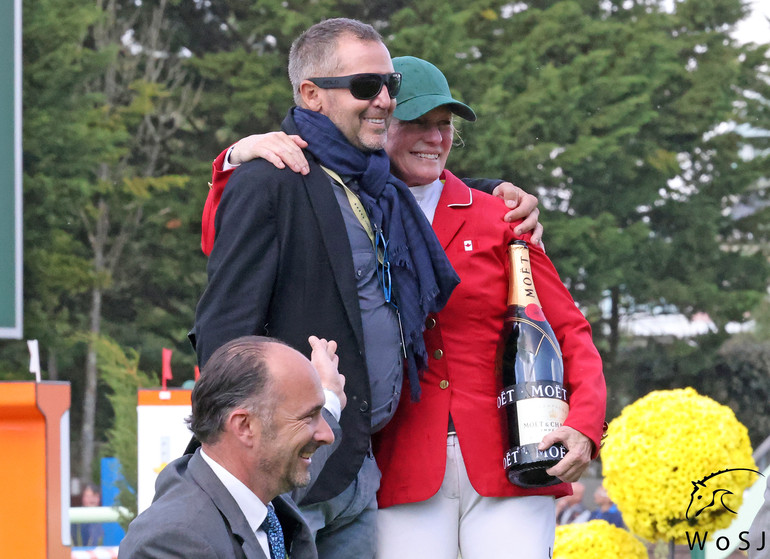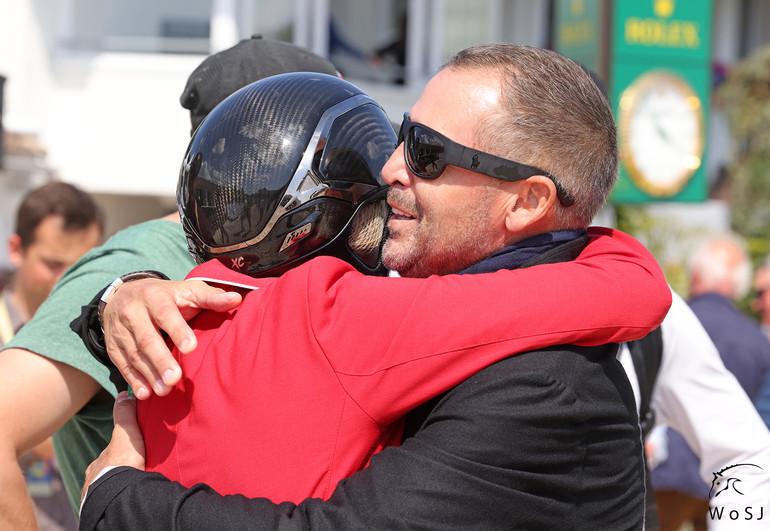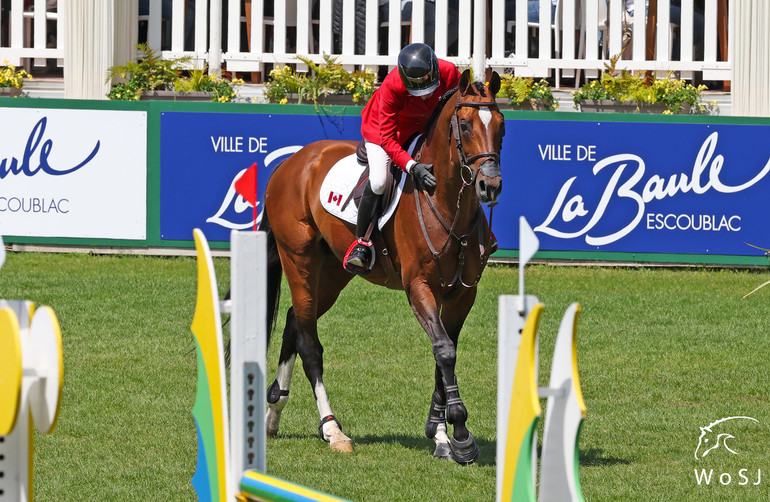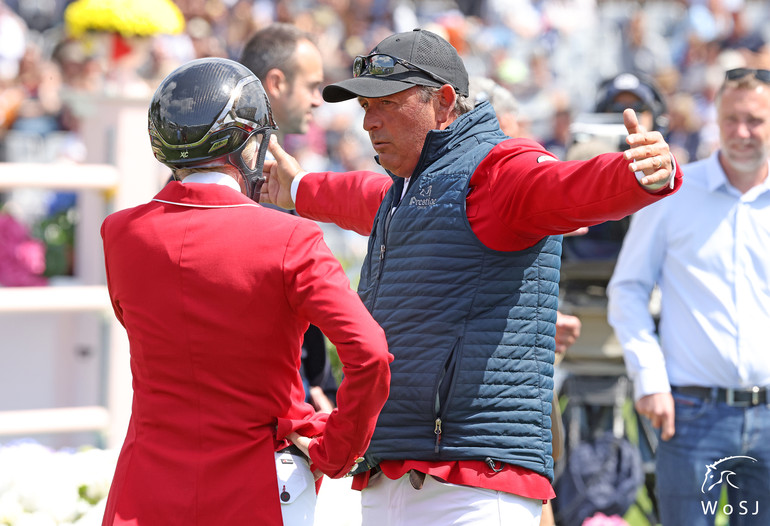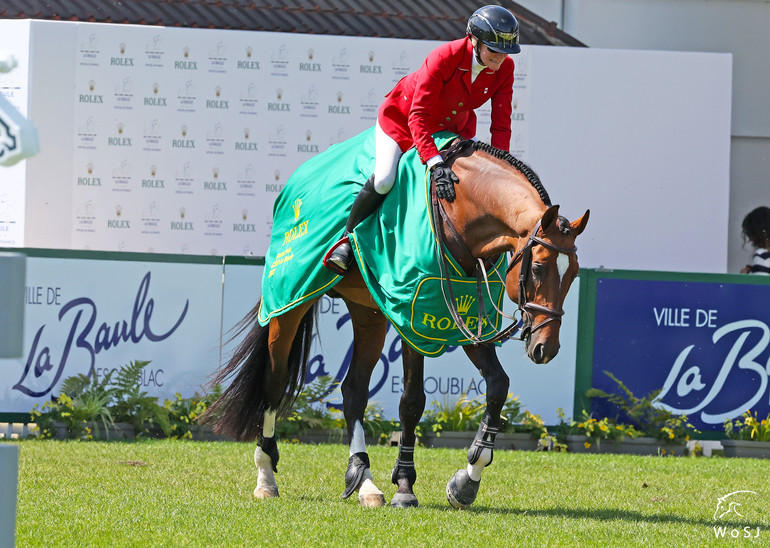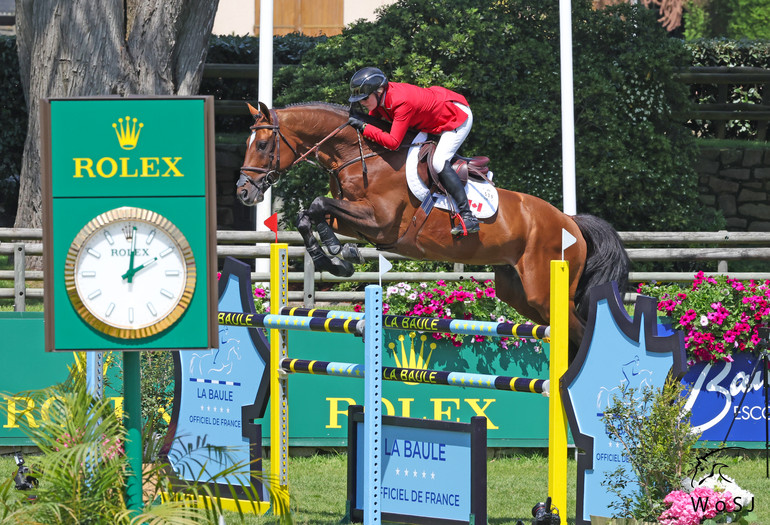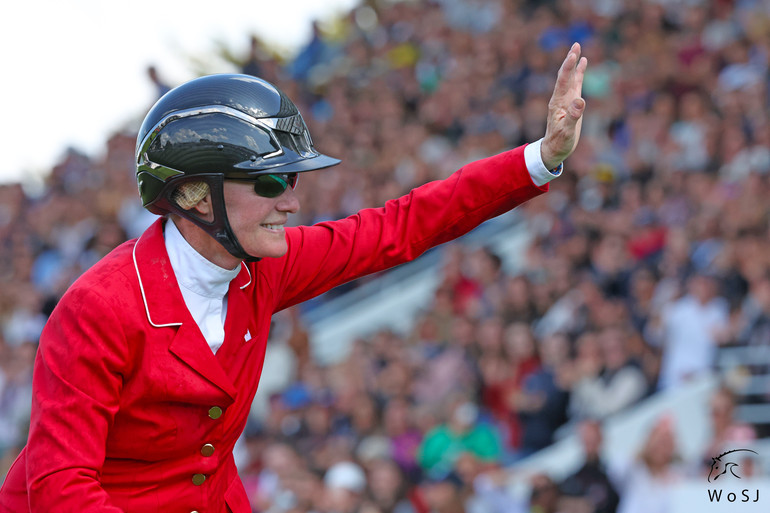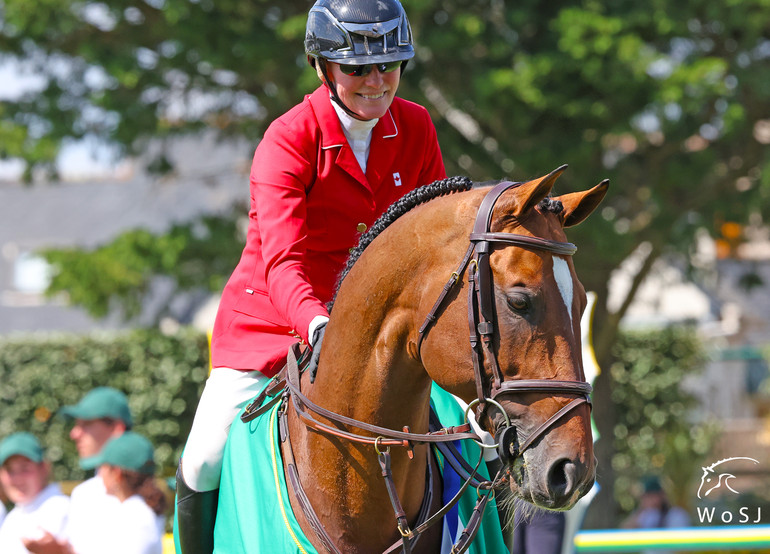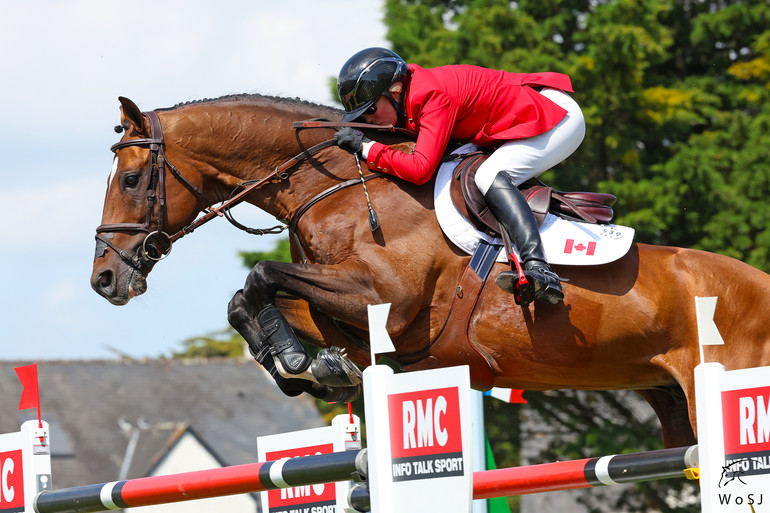
After having represented Canada at the 1992 Olympics in Barcelona, the 1994 World Equestrian Games in Den Hague and the 1998 World Equestrian Games in Rome, Beth Underhill has put herself back on the map for Canadian championship selection with the 13-year-old stallion Dieu Merci van T&L. Photo © Jenny Abrahamsson for World of Showjumping.
Text © World of Showjumping
After having represented Canada at the 1992 Olympics in Barcelona, the 1994 World Equestrian Games in Den Hague and the 1998 World Equestrian Games in Rome, Beth Underhill has put herself back on the map for Canadian championship selection with the 13-year-old stallion Dieu Merci van T&L (Toulon x Corrado I). At the beginning of May, Underhill and Dieu Merci van T&L jumped double clear in the CSIO5* Nations Cup of La Baule – helping Canada finish third – and took home the win in the prestigious Rolex Grand Prix at the same event. To World of Showjumping, the 59-year-old talks about the horses that have shaped her career, the importance of staying involved, her move to Torrey Pines Stable and how finding solace and peace in other areas of her life has helped her stay resilient in her career.
Singing vs. showjumping
Beth was introduced to horses by her mother and started riding at a local pony club near Toronto. Within a year, her parents had caught the horse-bug and the family moved from the city to a farm in the countryside where Beth got her first pony. “My mother had me do all kind of things to keep me interested after school, and I actually was a singer for a period of time,” Beth recalls.
“I won a silver medal for the Royal Conservatory of Music in Canada, with the highest score across the country for the test, so I had an option to go in that direction. The horses always pulled me another way though, and there came a point where my singing teacher told me that I needed to make a decision, because she thought I was not giving 100%. She said that I would not be successful if I didn’t give my all. She made me think and told me to come back in a week with a decision. I went back and said I was not going to sing anymore. She was a teacher I really respected, and I still appreciate her frankness. She taught me that sometimes, you have to give hard truths to your students. I think there are times when we have a responsibility as a coach to be honest, even if it is difficult news to share.”
Monopoly, Altair and Count Me In
Beth had a successful junior jumper career, and after finishing school she went to Mark Laskin as a working student. “After a couple of years in Western Canada with Mark, I came back to the East and started working for Torchy Millar,” Beth tells. “That is where I got my first top Grand Prix horse, Monopoly. I had him for ten years and we did it all; the Olympics, World Championships, World Cup Finals… When I was in Europe for the 1994 World Equestrian Games, I was introduced to the Hendrix-family through Torchy and bought a young horse named Altair who went on to be even better than Monopoly. We represented Canada on many teams, those were the two best horses I ever had. During the past six years, I had a horse called Count Me In, who was sold to Conor Swail last year.”
Riding at top level was something I knew I could do, but the hardest part for any rider is to find people who will support you
“My family helped me acquire Altair and there was a lot of financial burden put on for that horse to come to me,” Beth continues. “Since then, regardless of the results I have had, the years I have been in the sport, and the connections I have made, I could not find anyone to help me purchase a horse. As the years have gone by, it has only gotten harder with the prices getting exponentially higher. As a rider, you need someone who can afford to support you, and no one ever stepped up for me. I am 59 years old and I have been trying to get sponsors and syndicates in order to mount myself. Riding at top level was something I knew I could do, but the hardest part for any rider is to find people who will support you."
“However, I was always hopeful,” Beth tells. “I love the training aspect of the sport; I love flatting my horses and getting to know them. I am not someone who just shows up and wants to jump; I spend a lot of time getting to know each horse and looking at what system or program works for each individual. I have enjoyed working with various students over the years, from young riders to Grand Prix level. I have stayed very intrinsically involved in the sport in many ways: I was the Chef d’Equipe for the Canadian young rider team for several years, I am on the board of directors for the Royal Agricultural Winter Fair – our five-star World Cup event in Toronto, I have been on the high-performance committee that chooses the teams when I wasn’t riding at the team level. I was trying to look at what the sport needed in order to improve in our country and what I could do to help in every aspect. However, my first love was competing.”
I am not someone who just shows up and wants to jump; I spend a lot of time getting to know each horse and looking at what system or program works for each individual
“Where our sport diverges is that, particularly in North America, we have the amateur aspect and that side of the business. What is tough is that you see professionals having an 8am class with a student and then jumping a Grand Prix in the afternoon,” Beth points out. “It is hard to be that fragmented and still be able to focus on the job at hand. You don’t see that so much in Europe. It has kept the sport healthy in terms of giving professionals a strong business model. However, you don’t see owners purchasing horses for riders like before; owners would buy horses for the riders and their kids would ride as a hobby, whereas now you see more horses being bought for the amateurs. I think this has created a bit of a void for many young riders coming along.”
A masterclass, every day
Since November 2021, Beth has been riding for Eric Lamaze’s Torrey Pines Stable. “We have always been close – not only because we rode on the team together, but because there has always been a mutual respect and friendship between us,” Beth explains. “In November last year, I was over at his place in Belgium looking for horses for a student and he asked me if I would be interested in riding for him. It was a complete surprise for me; I did not expect it at all or consider he would think of me. ‘Am I up for this, can I do this, those are big shoes to fill’, I thought. However, I agreed immediately. For Eric to do that, in this point of my career, means everything to me. It absolutely means everything. I am so thankful for Eric and the Rein-family, who are the first to step up and support me in this way.”
I am so thankful for Eric and the Rein-family, who are the first to step up and support me in this way
“I moved to Eric in Wellington, even though I had been planning on going to California,” Beth continues. “We just changed everything around; I took some of my students and sale horses and we went and camped at Torrey Pines. After the circuit in Wellington, I came to Europe and one of my students came with me, while my staff at home kept the rest of my business going. My priority is to be here, under Eric’s wing.”
“When an opportunity to be at this level in the sport opened up for me, it was something I did not have to question or think too much about,” Beth says. “It is tough, though: My husband, my family, my everything is in Toronto. There were going to be sacrifices, it was going to take some adapting to make this work. However, everyone around me understood that this was an opportunity I needed to take.”
Every day with Eric is a masterclass; he has this innate understanding of horses
“Quite seamlessly, Eric and I worked very well together,” Beth tells. “The friendship has always been upper most, but he is also a tough taskmaster and he has high expectations of everyone on his team. He has very strong opinions on how he wants things to go – as he should. Every day with Eric is a masterclass; he has this innate understanding of horses. He is able to adjust to each horse’s personality and understand what needs to be changed in their program to make them the best they can be. When you look back at the successes he has had with so many horses, and what he has done in the business side of the sport, the owners he has been involved with for many years – it is uncanny. To be beside someone like Eric and to learn from him is an opportunity that I am so fortunate to have.”
An open book
“I have friends here, but to come over and ride on this level, for sure it is daunting, I am not going to lie,” Beth tells about her move to Europe. “However, I would say my strength is that I can go into the ring and stay mentally focused. Life experience teaches you how to react in those pressured situations. The team events are very important to me, and I find I can usually quell those nerves and give my best. I really looked forward to that part of it, even though it was a daunting prospect to come here, knowing that people were looking, and I am sure critiquing and questioning why Eric would go with me. But I knew, that for him it was important that it was people he trusted, that he knew would go into his system without question – which I was prepared to do. Also, Eric is passionate about strengthening the Canadian team and I believe me being a Canadian was an important factor for him.”
Eric just immediately senses what each horse and rider needs, and that is a gift
“I think you have to come into a situation like this – when you are riding and working with someone of Eric’s level – with an open mind, but still bring the things that you know,” Beth continues. “There were aspects in our training that I could not do, ways that Eric would want me to ride, where I would have to say, ‘I am not you, I can’t.’ We had to manage that side and it was a bit of an experiment in the beginning. However, I think we found a way where I can still ride in the way I am comfortable with but incorporate all Eric’s input. It has been a learning experience for both of us. I definitely came over here as an open book. He can say whatever, keep repeating, and I will keep listening. I always try to be involved and present in all of his lessons. The opportunity to be at this place at this time with Eric, is so special. His observations are what I find really fascinating. He is so quick to observe a small thing that has a large effect. Eric just immediately senses what each horse and rider needs, and that is a gift. For me, everything I am learning here is something I will take and give back to my students and to the sport in Canada. For me it is very rewarding: We are helping each other be stronger and better.”
The opportunity to be at this place at this time with Eric, is so special
“Part of it comes from maturity, part of it is a mindset,” Beth continues about the importance of keeping an open mind. “It is a critical part of developing as a rider and being the best you can be. Maybe it is a bit easier for women, as we tend to not have as much of an ego, I sure don’t. But just look at someone like Ian Millar: He is still a student of the sport; at the ring every day, watching, learning. If you have come to a point where you feel you have nothing to learn, then you should stop – the only way to progress is learning, and you never know it all. I think that young riders have to be very mindful of staying current.”
Underdogs
“Historically, Canadians are horse-poor,” Beth tells about the Canadian team. “We are a very large country, but we don’t have a lot of riders and it is really tough to get owners. We have always had extraordinary results if you look back at major games, and usually as underdogs. We help each other and the relationships we have created among ourselves have given us strength when the chips are down. Having said that, it is not good enough at the top level in this sport, and we know that. Our federation is fairly poor, so we don’t always have the funds to send people to Europe and that is something Eric is really mindful of – we all recognize that you improve by competing in Europe.”
We are hoping to continue to build with the World Championships in Herning in mind
“We came away from La Baule feeling that we had things to work on, but it was a great start,” Beth continues. “I had never been to La Baule. I think we were all taken aback by the electricity of the crowd, and how educated and enthusiastic they were. I did not expect to be received as we were: They were chanting Eric’s name during the parade. It was so emotional, and I think us in that parade thought we have got to deliver – for him. I think we all felt that. It was very important for us to be the best that we could be and give a good team result. Now, we are aware of what we need to do and what is next to come. We are hoping to continue to build with the World Championships in Herning in mind. It is definitely our goal for the year.”
Dieu Merci van T&L: A short, but very rewarding partnership
The 13-year-old stallion that Beth was victorious with in La Baule, was previously ridden by Lamaze – who in November 2021 handed over the reins to Beth when she joined Torrey Pines. “He came to Florida quite late and being a stallion, we were slow getting started due to the quarantine,” Beth explains. “I did not have much opportunity to show him, but I immediately liked him. He is a very generous horse and tries hard to do his best. Right away, I felt comfortable with him: He has a big gallop with a natural, forward stride, which suits my innate style. Eric riding him and knowing him so well was obviously a huge asset. It has been a short, but very rewarding partnership with him so far. Our plan is gearing towards hopefully a place on the World Championship team, if all goes well. However, I try not to get too caught up on things far away, I don’t like to tempt fate. I am really thrilled with where I am and I believe that by continuing to improve myself and the horses, things will turn out the way they should.”
Play the cards you’re dealt
“I never stopped trying to create opportunities to have top-level horses, but I was also ok if it did not happen in the end,” Beth tells about her years in the sport without a mount for the highest level. “It was not going to break me if it didn’t happen. I have been able to do the sport in a way that has made me happy, and I think that is important too. If you are only thinking “I have to get to that level, I have to do this, I have to do that” – you won’t be happy. I believe you have to play the cards you’re dealt and do the best you can. When you relax and just keep opportunities open, something like this with Eric comes along.”
I have been able to do the sport in a way that has made me happy, and I think that is important too
“As riders and professionals, how we present ourselves to our peers is critical, because that is what people see, that is the respect that they have for you,” Beth says. “I have been able to be involved with people I feel fortunate to call friends and colleagues, people who have helped me over the years. That to me, has been important, if not more so than those moments where everything goes your way and you come home with a win like La Baule. How you present yourself, who you involve yourself with – for me, that has been essential.”
I have found solace and peace in other aspects of my life, so that when my career has not always gone the way I have wanted, I have stayed balanced
“I work hard, but I am also able to step back and look at the things that give me peace; my family, my five rescue pigs, my orphan goats that I raised and hand fed,” Beth continues. “I like to walk through the property and see those things. My family is very important to me, and so are the animals, as well as the friendships I have made. I have found solace and peace in other aspects of my life, so that when my career has not always gone the way I have wanted, I have stayed balanced. I have hoped it comes along with a mindset that I am never going to stop pushing for those opportunities and improving where I am, while at the same time remembering that if for a moment, or forever, this is as good as it got, it is not so bad. I have been able to give back to the sport, I have a busy business, I have been able to be successful professionally on my own as a woman, and still keep those important relationships – to me, that is success and happiness.”
Give back and be involved
While Beth might have missed a horse for the top sport, it never kept her from staying closely involved – which is something she encourages more riders to do. “I love every aspect of the sport, I really do – and I love horses,” Beth says. “That is what we have to remember; it all starts with the love for the horse. There is not much about the sport that I find tiresome. As riders, especially as we become more mature, available and educated in the sport, it is important to give back. It is about constantly feeding the system: We have to educate by example. I try to behave in a way that my students will appreciate as the best behaviour in sport. Being involved certainly gives you a better understanding of the sport as a whole. It has been important to me, that my riders behave in a particular way, that they are respectful of the stewards, aware of the rules. It cannot be their groom or trainer telling them what to do, they have to be really involved themselves. Growing up, I always looked after my own horses and you still see this in Europe, but in North America the sport has changed. It has become more a customer service industry, which I think has been to our detriment.”
Stay educated and have a voice, and be prepared to say what needs to be said – even if it is not popular
“It seems like a lot of things happen unilaterally,” Beth continues. “However, us riders can be a little bit of our own worst enemy. Not all of us, but many riders don’t read about rules that are coming up or what is important to focus, vote or lobby for. That is something that as riders, we have to take responsibility for, even though it is tough. Everyone is busy and the last thing you want to do at night is to read in order to understand what is going on. However, it is integral for the wellbeing of our sport. Unfortunately, when riders aren’t staying current and involved, they don’t get the respect they should have. In general, riders need to take that among themselves: Stay educated and have a voice, and be prepared to say what needs to be said – even if it is not popular.”
Remember your why
“There are so many, but for me, it is resilience,” Beth tells about the biggest lesson she has learned during her years in the sport. “There are so many ups and downs: You are going to lose more than you are going to win, so you better find a way to deal with it. You must have an understanding of why you are doing this and what you love about it, so that you are able to accept those bad times, learn from them and move forward. To me, it is always about moving forward in a positive way. You learn from the mistakes you made and the inevitable tragedies that happened in your life. You have to put them in a proper perspective, so that they don’t break you but make you stronger.”
You must have an understanding of why you are doing this and what you love about it, so that you are able to accept those bad times, learn from them and move forward
“There are life lessons in this sport every day,” Beth says. “We all have times when we feel everything is going so well we have it all figured out and conversely when things aren’t going our way it can be difficult to see a way forward. Neither of these are absolute realities but it can be challenging to maintain one’s confidence and perspective with the vagaries of this sport, particularly when partnered with a sensitive, dynamic horse. How you react to these inevitable highs and lows defines you as a person and an athlete and is what keeps us striving to do our best.”
No reproduction without written permission, copyright © World of Showjumping.com



